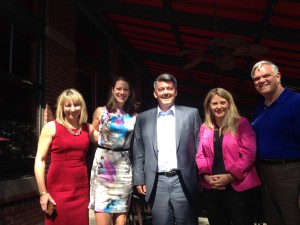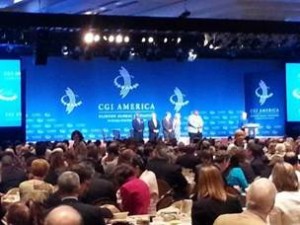In this Capitol Report:
- The Politics of Fracking Are Headed Toward Colorado’s Ballot Box
- BIPAC Endorses U.S. Representative Cory Gardner for Election to the U.S. Senate
- Clinton Global Initiative Hosted Its Annual Americas Meeting in Denver
- Building a Successful Return-to-Work Program
- EPA Announces More Dates For Carbon Emissions Hearings
- U.S. Supreme Court Finishes Session With Landmark Decisions
This Capitol Report is brought to you by:
State Policy News
The Politics of Fracking Are Headed Toward Colorado’s Ballot Box
NOTE: The following analysis by the Eurasia Group of Colorado’s oil-and-gas and local-governmental-control ballot initiatives was supplied to CACI President Chuck Berry by his daughter, Martha Berry, who works in the energy section of the Eurasia Group. The Eurasia Group has agreed to allow CACI to distribute the article to its members because CACI found the analysis to be a balanced and objective examination of a very important issue not only for Colorado but for the entire country. The Eurasia Group is headquartered in New York City with offices in London and Washington, D.C. It is the world’s largest political risk consulting company, with a special focus on energy.
The politics of fracking are headed toward Colorado’s ballot box
Divya Reddy and Hilary Novik, Eurasia Group
Colorado Governor John Hickenlooper’s effort to call a special summer session to pass a compromise bill on local control for oil and gas drilling is facing an uphill struggle. Failure to pass legislation will increase the likelihood that the initiatives appear as ballot initiatives in November’s election. Should the initiatives pass at the ballot box, they will heighten operational uncertainties for producers in the Niobrara, and could intensify a trend toward municipal oversight nationally.
As the Colorado oil and gas industry positions itself for the prospect of a costly battle over ballot initiatives to grant municipal authority to regulate drilling activity, Governor John Hickenlooper has been trying to call a special legislative session to pass a compromise bill that would settle the issue and avoid the ballot option. Specifically, the Hickenlooper solution would give local governments the right to regulate more narrow areas of drilling such as noise, setbacks, and inspections of operations, while continuing to leave broader regulatory issues, including bans, in state hands. The issue has come to a head as ballot initiatives to impose setbacks and constitutionally grant regulatory authority to municipalities, many sponsored by US Representative Jared Polis (D-CO), advance. Polis, is putting his sizable personal wealth behind the ballot efforts. Importantly, Hickenlooper received assurances from Polis that he would drop the ballot initiatives if the special session bill were to pass, on the condition that the existing language does not change. Already, five municipalities in Colorado (Boulder, Fort Collins, Lafayette, Broomfield, and Longmont) have passed moratoria on fracking, but most recently on 25 June, the city of Loveland rejected a ballot initiative for a fracking moratorium.
Nonetheless, it is looking less and less likely that Hickenlooper can line up enough support from the Democrat-controlled legislature to pass the bill. Hickenlooper is unlikely to move forward with a special session at all unless he is fully confident in its ability to pass his bill. To that end, the governor himself has turned more pessimistic on the prospects, conceding that the probability of a special session to address the municipal rights issue–which he pegged at 50% when the legislature adjourned last month–was now slightly below 50%. The main challenge facing Hickenlooper that is factoring into legislative support for the measure is significant disagreement from the industry on its benefits. While companies such as Anadarko and Noble, which operate in the massive Wattenburg field and are most exposed to municipal interventions in Weld County, have backed the bill, the majority of companies operating in the state (including BP, Encana, Chevron, and ConocoPhillips) oppose additional regulation on the sector. As such, the chances that enough legislators line up behind the bill to warrant a special session and pass the bill are dimming. If the special session does not materialize, the issue could play out through the ballot initiative process in Colorado. Among the ballot initiatives that would negatively impact the sector are Initiative 88 that would impose drilling setbacks from homes of 2,000 feet (current law imposes 500 feet setbacks), Initiatives 90, 91, 92, and 93 that all give local governments the authority to limit or prohibit drilling, and Initiative 89 that is a general environmental bill of rights. The state Supreme Court has granted approval to most of the measures, allowing them to move toward signature collection. In order to get an initiative on the November ballot, 86,105 signatures will be required by 4 August. Backers of the ballots, including Polis, are said to be offering $10 per signature in an effort to meet the requirement. The industry is responding with an aggressive advertising campaign to counter the efforts. Although it is difficult to predict whether the initiatives will appear on the ballot in November, the risks are definitely on the rise.
Ultimately, should the initiatives appear on the ballot and pass, the impact will vary considerably. Although most municipalities would not choose to exercise their authority to ban fracking even if granted it, the risk that some might do so would likely deal a significant blow to operations in the state. At the end of the day, the net impact will be a more uncertain operating environment for companies drilling in the Niobrara as well as an uptick in their marginal costs.
Colorado has been and will continue to be an important component to the US crude production outlook. The state has seen production more than double between 2009 and 2013, from 83,000 barrels per day (bpd) to 176,000 bpd, largely driven by tight oil production. The Niobrara shale, situated in northeast Colorado and in parts of adjacent Wyoming, Nebraska, and Kansas is the major tight oil play in the Denver-Julesburg (DJ) Basin. While the greater DJ Basin has been compared to the Bakken shale, the Niobrara is still an emerging play and in need of continued investment and infrastructure by companies already operating in the area such as Anadarko and Noble. Currently, estimated reserves in the Niobrara are up to 2 billion barrels out of the 7 billion in the DJ Basin. The EIA estimated April Niobrara production at 306,000 bpd out of total US production of 8.4 million bpd. The most active Colorado counties in the Niobrara include Weld County, Arapahoe County, and Morgan County, but the bulk of activity is concentrated in Weld Country (10,439 producing wells with an output of 3.8 million barrels in January), which encompasses or neighbors the cities that have undertaken moratoria. Given the Niobrara’s close proximity to these populated areas, the ballot initiatives were a direct reaction to the increase in production over the past couple of years.
Even nationally, all eyes will be on Colorado in November, should passage of anti-fracking ballot measures set a precedent for municipalities elsewhere. Colorado, like some Western states, has a process for citizen’s initiatives through ballots. Elsewhere, the matter will more likely be settled in the courts. To that end, other states are already seeing court settlements to give local governments more responsibility for regulating drilling activities. Just this week, the highest court of New York ruled that cities and towns within the state can block fracking within their municipalities following a challenge by companies to zoning ordinances by two towns. Although drilling activity in New York is minimal due to a six-year statewide moratorium on fracking, the rule will not only deal a blow to longer-term prospects of drilling should the moratorium be lifted but could also set a precedent for legal challenges on municipal control in other states. Previously in December, the Pennsylvania Supreme Court upheld a local court ruling that struck down certain aspects of the Oil and Gas Act of Pennsylvania (which specifically sought to preempt local government authority with uniform state-wide regulation), creating uncertainty for Marcellus producers. Looking ahead, Ohio’s Supreme Court is due to rule this fall on a similar case to New York’s on whether state oversight of oil and gas drilling supersedes municipal authority to impose limits, just as Utica shale gas production is poised to take off there.
On balance, although only a small portion of municipalities are pursuing fracking limits, the trend toward granting municipal authority will increase risks and uncertainties for producers throughout the country should other local governments become emboldened by Colorado’s ballot process or court decisions, especially if local sentiment against fracking were to rise in conjunction with increased drilling activity.
Eurasia Group |1818 N Street NW, 7th Floor, Washington DC, 20036 | 202-298-6300 | www.eurasiagroup.net
BIPAC Endorses U.S. Representative Cory Gardner for Election to the U.S. Senate

From left to right: Loren Furman, CACI; Leah Curtsinger, CACI; Congressman Cory Gardner; Jenn Penn, BIPAC; Chuck Berry, CACI.
This week, the Business-Industry Political Action Committee (BIPAC) announced its endorsement of Republican Congressman Cory Gardner for election to the U.S. Senate.
Congressman Gardner is engaged in a close race for the U.S. Senate with incumbent Democratic U.S. Senator Mark Udall. Congressman Gardner represents Colorado’s Fourth Congressional District.
BIPAC was represented at the announcement by Jenn Penn, BIPAC Mountain Regional Vice President. BIPAC’s Action Fund will make a contribution to Representative Gardner’s campaign.
About BIPAC
The Business-Industry Political Action Committee (BIPAC) was founded in 1963 as “an independent, bipartisan group,” to serve as a political action arm for American business and industry. BIPAC provides its members with the tools and strategies they need to keep their employees abreast of the key policy decisions impacting their livelihood and opportunities to get involved in the public policy process.
BIPAC helps state business organizations like CACI impact political outcomes beyond the Washington, D.C., “Beltway” through the nation’s largest, employee-focused grassroots network in the states. BIPAC provides meaningful political analysis to keep members informed, crafts forward-thinking election strategies and deploys cutting-edge, political-action committee and grassroots tools-and-technology to power the business community’s engines of advocacy.
Colorado Prosperity Project
BIPAC partnered with CACI some years ago to deploy the Colorado Prosperity Project (CO P2).
Clinton Global Initiative Hosted Its Annual Americas Meeting in Denver
The Clinton Global Initiative hosted its annual Americas meeting in Denver last week. One of the major themes of the event was preparing youth for entry into the job market especially in sectors like manufacturing.
into the job market especially in sectors like manufacturing.
A live poll conducted during one of the plenary sessions illustrated a point that many already know: 91 percent of respondents believe that the U.S. does not do a good job of connecting low-skill youth with job training programs.
This point was made clearer when a state policymaker explained the dilemma that many of his acquaintances face. He explained that many of the people he knows work in professional services; they’re doctors, lawyers, CPAs, etc.
And many of their children go off to college only to drop out a year or two later. Their children end up moving back in with mom and dad and doing odd jobs around the house in order to “pay their way” while they consider their next steps.
“Wouldn’t it make more sense to send these kids to trade schools to learn how to be a carpenter or electrician?” he asked, “They could learn how to be a welder or machinist in less time than it will take their friends to graduate from college and they’ll be earning more than their friends who will struggle to find a job as an attorney or accountant after graduation.”
These anecdotes highlight the single biggest issue facing American manufacturing. For too long, manufacturing has been regarded by many as “dull, dirty and dangerous.” America’s youth, consequently, are no longer pursuing well-paid, respectable jobs in manufacturing. At the Clinton Global Initiative conference last week, former Secretary of State and U.S. Senator Hillary Clinton warned that the United States stands to lose $20 billion in economic output over the next decade as a result of unemployed or underutilized youth workers.
Fortunately, there are several initiatives underway at the local, state and Federal governmental levels to engage youth and encourage them to pursue technical trades.
For example, the Manufacturing Institute and National Association of Manufacturers are working to promote industry recognized certifications in such areas as welding and machining through the Right Skills Now program. And at the state level, the Colorado Community College System is working to implement career pathways, thanks to the passage of last year’s HB-1165. CACI and other business groups are working to change how students and parents regard manufacturing and to make sure that today’s youth are prepared to be tomorrow’s workforce.
CACI members involved in workforce development for manufacturers should contact Patrick Pratt at [email protected]
Building a Successful Return-to-Work Program
You have the power to control your workers’ compensation costs. Injury prevention is the best approach, but if a workplace accident does occur, claims management is key, starting with a return-to-work program. The return-to-work program is a proactive plan to help injured workers start working again during their recovery, either at their regular positions or in a modified duty position. Read more.
Federal Policy News
EPA Announces More Dates For Carbon Emissions Hearings
Denver will now have two dates—July 29th & 30th–when businesses and members of the community can share testimony regarding the EPA’s proposed “existing power plant” carbon-emissions rule.
Although the EPA proposal put forward three potential emissions reductions plans, the most aggressive is the proposed 30 percent reduction by 2030 where states would be given flexibility to determine statewide approaches for:
- Increasing efficiency of all energy producers,
- Increasing efficiency of existing power plants,
- Transitioning power plants from coal to natural gas and
- Increasing renewables.
Because this proposed rule has the potential to affect many Colorado businesses, CACI members should take a minute to sign up for testimony on July 29th or 30th.
- Bring the business & industry voice to the table – Sign up to testify here.
July 29th & 30th
9am – 8pm, EPA Region 8 Building, 1595 Wynkoop Street
Lunch & dinner breaks will be one hour, from noon-1pm & 5-6pm
- You can also submit written comments to EPA here, noting Docket ID# EPA-HQ-OAR-2013-0602.
Written comments are due by Oct. 16, 2014
*** PLEASE NOTE: Anyone entering the Region 8 Federal Building will need to pass through a security screening & have ID, while those confirmed for testimony will need to provide two forms of government-issued photo IDs.
U.S. Supreme Court Finishes Session With Landmark Decisions
SCOTUS issued four major opinions affecting businesses in the last two weeks
- The Court ruled in Noel Canning vs. NLRB, 9-0, that recess appointments made by President Obama to the National Labor Relations Board (NLRB) during a 2012 Congressional recess were unconstitutional as the President circumvented Constitutional powers of Congress to “vet” nominees. This decision likely overturns more than 100 decisions made by the NLRB but still allows for recess appointments if Congress is ever recessed for more than ten days. The President’s appointments had taken place during a three-day pro forma break, and the NLRB seats had not come open during those three days.
- A 6-3 Court ruled that Aereo infringed on broadcaster and content producer rights by taking over-the-air signals without permission or payment and then selling that unlicensed content over the Internet. Aereo is now turning to Congress for help.
- The Court issued a partial labor ruling, outlining new parameters for requiring public employees to pay union dues. The Court ruled that, in an Illinois case, home health workers classified as public employees (who work within a union contract) could not be compelled to pay dues, overturning a long-held standard but not going so far as to overturn 30+ years of union dues-paying precedent.
- In a 5-4 opinion, the Court ruled in the case of Burwell vs. Hobby Lobby Stores that the Federal Affordable Care Act cannot force for-profit employers to provide certain health-care items against religious beliefs.


